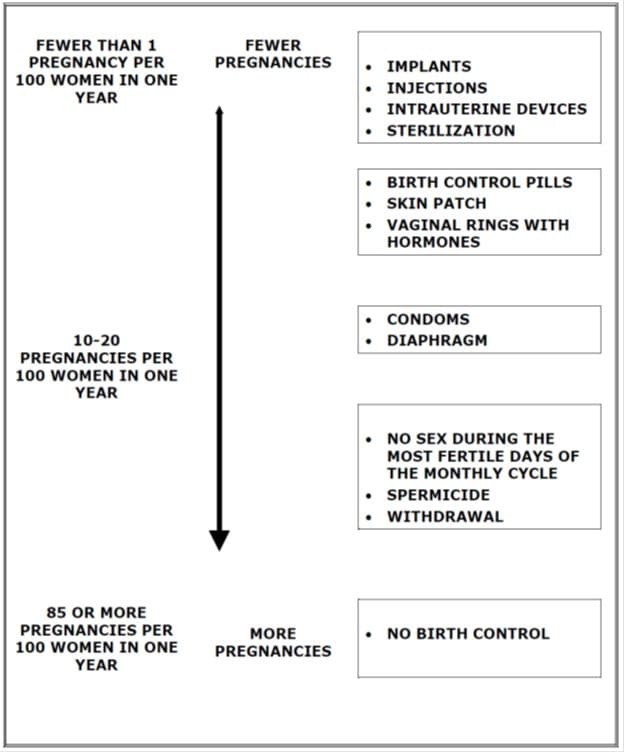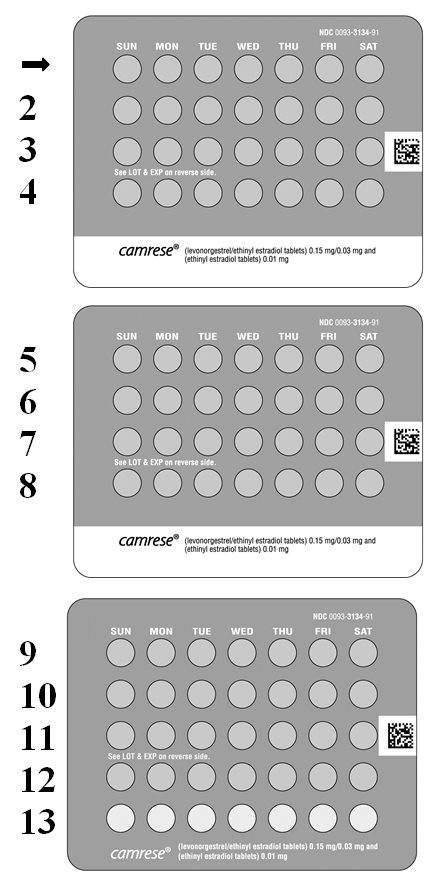What is Camrese?
Camrese is a birth control pill. It contains two female hormones, an estrogen called ethinyl estradiol, and a progestin called levonorgestrel.
How Well Does Camrese Work?
Your chance of getting pregnant depends on how well you follow the directions for taking your birth control pills. The more carefully you follow the directions, the less chance you have of getting pregnant.
Based on the results of a single clinical study lasting 12 months, 1 to 3 women, out of 100 women, may get pregnant during the first year they use Camrese.
The following chart shows the chance of getting pregnant for women who use different methods of birth control. Each box on the chart contains a list of birth control methods that are similar in effectiveness. The most effective methods are at the top of the chart. The box on the bottom of the chart shows the chance of getting pregnant for women who do not use birth control and are trying to get pregnant.

What is the most important information I should know about Camrese?
Do not use Camrese if you smoke cigarettes and are over 35 years old. Smoking increases your risk of serious cardiovascular side effects from birth control pills, including death from heart attack, blood clots or stroke. This risk increases with age and the number of cigarettes you smoke.
Birth control pills help to lower the chances of becoming pregnant. They do not protect against HIV infection (AIDS) and other sexually transmitted diseases.
Who should not take Camrese?
Your healthcare provider will not give you Camrese if you have:
- Ever had breast cancer or any cancer that is sensitive to female hormones
- Liver disease, including liver tumors
- Been prescribed any Hepatitis C drug combination containing ombitasvir/paritaprevir/ritonavir, with or without dasabuvir. This may increase levels of the liver enzyme “alanine aminotransferase” (ALT) in the blood
- Ever had blood clots in your arms, legs, or lungs
- Ever had a stroke
- Ever had a heart attack
- Certain heart valve problems or heart rhythm abnormalities that can cause blood clots to form in the heart
- An inherited problem with your blood that makes it clot more than normal
- High blood pressure that medicine can't control
- Diabetes with kidney, eye, or blood vessel damage
- Certain kinds of severe migraine headaches with aura, numbness, weakness or changes in vision
Also, do not take birth control pills if you:
- Smoke and are over 35 years old
- Are pregnant
Birth control pills may not be a good choice for you if you have ever had jaundice (yellowing of the skin or eyes) caused by pregnancy.
What should I tell my healthcare provider before taking Camrese?
Tell your healthcare provider about all medicines and herbal products that you take. Some medicines and herbal products may make birth control pills less effective, including:
- barbiturates
- bosentan
- carbamazepine
- felbamate
- griseofulvin
- oxcarbazepine
- phenytoin
- rifampin
- St. John’s wort
- topiramate
Consider using another birth control method when you take medicines that may make birth control pills less effective.
Birth control pills may interact with lamotrigine, an anticonvulsant used for epilepsy. This may increase the risk of seizures, so your physician may need to adjust the dose of lamotrigine.
If you have vomiting or diarrhea, your birth control pills may not work as well. Use another birth control method, like condoms or a spermicide, until you check with your healthcare provider.
How should I take Camrese?
1. Take one pill every day at the same time. If you miss pills you could get pregnant. This includes starting the pack late. The more pills you miss, the more likely you are to get pregnant.
2. Many women have spotting or light bleeding, or may feel sick to their stomach during the first few months of taking Camrese. If you feel sick to your stomach, do not stop taking the pill. The problem will usually go away. If it doesn't go away, check with your healthcare provider.
3. Missing pills can also cause spotting or light bleeding, even when you take the missed pills later. On the days you take 2 pills to make up for missed pills, you could also feel a little sick to your stomach.
4. If you have trouble remembering to take Camrese, talk to your healthcare provider about how to make pill-taking easier or about using another method of birth control.
Before you start taking Camrese
1. Decide what time of day you want to take your pill. It is important to take it at about the same time every day.
2. Look at your Extended-Cycle Tablet Dispenser. Your Tablet Dispenser consists of 3 trays with cards that hold 91 individually sealed pills (a 13-week or 91-day cycle). The 91 pills consist of 84 light blue-green and 7 yellow pills. Trays 1 and 2 each contain 28 light blue-green pills (4 rows of 7 pills). Tray 3 contains 35 pills consisting of 28 light blue-green pills (4 rows of 7 pills) and 7 yellow pills (1 row of 7 pills).

3. Also find:
- Where on the first tray in the pack to start taking pills (upper left corner at the start arrow) and
- In what order to take the pills (follow the weeks and arrow).
4. Be sure you have ready at all times another kind of birth control (such as condoms or spermicides), to use as a back-up in case you miss pills.
When to Start Camrese
1. Take the first light blue-green pill on the Sunday after your period starts, even if you are still bleeding. If your period begins on Sunday, start the first light blue-green pill that same day.
2. Use another method of birth control (such as condoms or spermicides) as a back-up method if you have sex anytime from the Sunday you start your first light blue-green pill until the next Sunday (first 7 days). If you have been using a different hormonal method of birth control (such as a different pill, the “patch,” or the “vaginal ring”), you need to use another method of birth control (such as condoms or spermicides) each time you have sex after stopping your old method of birth control until you have taken Camrese for 7 days.
How to Take Camrese
1. Take one pill at the same time every day until you have taken the last pill in the tablet dispenser.
- Do not skip pills even if you are experiencing spotting or bleeding or feel sick to your stomach (nausea).
- Do not skip pills even if you do not have sex very often.
2. When you finish a tablet dispenser
- After taking the last yellow pill, start taking the first light blue-green pill from a new Extended-Cycle Tablet Dispenser the very next day (this should be on a Sunday) regardless of when your period started.
3. If you miss your scheduled period when you are taking the yellow pills, contact your healthcare provider because you may be pregnant. If you are pregnant, you should stop taking Camrese.
What To Do If You Miss Pills
If you MISS 1 light blue-green pill:
1. Take it as soon as you remember. Take the next pill at your regular time. This means you may take 2 pills in 1 day.
2. You do not need to use a back-up birth control method if you have sex.
If you MISS 2 light blue-green pills in a row:
1. Take 2 pills on the day you remember, and 2 pills the next day.
2. Then take 1 pill a day until you finish the pack.
3. You could become pregnant if you have sex in the 7 days after you miss two pills. You MUST use another birth control method (such as condoms or spermicide) as a back up for the 7 days after you restart your pills.
If you MISS 3 OR MORE light blue-green pills in a row:
1. Do not take the missed pills. Keep taking 1 pill every day as indicated on the pack until you have completed all of the remaining pills in the pack. For example: If you resume taking the pill on Thursday, take the pill under “Thursday” and do not take the missed pills. You may experience bleeding during the week following the missed pills.
2. You could become pregnant if you have sex during the days of missed pills or during the first 7 days after restarting your pills.
3. You MUST use a non-hormonal birth control method (such as condoms or spermicide) as a back-up when you miss pills and for the first 7 days after you restart your pills. If you do not have your period when you are taking the yellow pills, call your healthcare provider because you may be pregnant.
If you MISS ANY of the 7 yellow pills:
1. Throw away the missed pills.
2. Keep taking the scheduled pills until the pack is finished.
3. You do not need a back-up method of birth control.
Finally, if you are still not sure what to do about the pills you have missed
1. Use a back-up method anytime you have sex.
2. Keep taking one pill each day until you contact your healthcare provider.
What Else Should I Know About Taking Camrese?
Birth control pills do not protect you against any sexually transmitted disease, including HIV, the virus that causes AIDS.
Do not skip any pills, even if you do not have sex often.
Birth control pills should not be taken during pregnancy. However, birth control pills taken by accident during pregnancy are not known to cause birth defects.
If you are breastfeeding, consider another birth control method until you are ready to stop breastfeeding. Birth control pills that contain estrogen, like Camrese, may decrease the amount of milk you make. A small amount of the pill's hormones pass into breast milk.
What are the possible side effects of Camrese?
Like pregnancy, birth control pills increase the risk of serious blood clots, especially in women who have other risk factors, such as smoking, obesity, or age > 35. It is possible to die from a problem caused by a blood clot, such as a heart attack or a stroke. Some examples of serious blood clots are blood clots in the:
- Legs (thrombophlebitis)
- Lungs (pulmonary embolus)
- Eyes (loss of eyesight)
- Heart (heart attack)
- Brain (stroke)
Women who take birth control pills may get:
- High blood pressure
- Gallbladder problems
- Rare cancerous or noncancerous liver tumors
All of these events are uncommon in healthy women.
Call your healthcare provider right away if you have:
- Persistent leg pain
- Sudden shortness of breath
- Sudden blindness, partial or complete
- Severe pain in your chest
- Sudden, severe headache unlike your usual headaches
- Weakness or numbness in an arm or leg, or trouble speaking
- Yellowing of the skin or eyeballs
What Are Common Side Effects Of Birth Control Pills?
The most common side effects of birth control pills are:
- Spotting or bleeding between menstrual periods
- Nausea
- Breast tenderness
- Headache
These side effects are usually mild and usually disappear with time.
Less common side effects are:
- Acne
- Less sexual desire
- Bloating or fluid retention
- Blotchy darkening of the skin, especially on the face
- High blood sugar, especially in women who already have diabetes
- High fat levels in the blood
- Depression, especially if you have had depression in the past. Call your healthcare provider immediately if you have any thoughts of harming yourself.
- Problems tolerating contact lenses
- Weight changes
This is not a complete list of possible side effects. Talk to your healthcare provider if you develop any side effects that concern you. You may report side effects to the FDA at 1-800-FDA-1088.
No serious problems have been reported from a birth control pill overdose, even when accidentally taken by children.
Do Birth Control Pills Cause Cancer?
Birth control pills do not appear to cause breast cancer. However, if you have breast cancer now, or have had it in the past, do not use birth control pills because some breast cancers are sensitive to hormones.
Women who use birth control pills may have a slightly higher chance of getting cervical cancer. However, this may be due to other reasons such as having more sexual partners.
What Should I Know About My Period When Taking Camrese?
When you take Camrese, which has a 91-day extended dosing cycle, you should expect to have 4 scheduled periods per year (bleeding when you are taking the 7 yellow pills). Each period is likely to last about 3 days. However, you will probably have more bleeding or spotting between your scheduled periods than if you were using a birth control pill with a 28-day dosing cycle. During the first Camrese 91-day treatment cycle, about 3 in 10 women may have 20 or more days of unplanned bleeding or spotting. This bleeding or spotting tends to decrease with time. Do not stop taking Camrese because of this bleeding or spotting. If the spotting continues for more than 7 consecutive days or if the bleeding is heavy, call your healthcare provider.
What If I Miss My Scheduled Period When Taking Camrese?
You should consider the possibility that you are pregnant if you miss your scheduled period (no bleeding on the days that you are taking yellow tablets). Since scheduled periods are less frequent when you are taking Camrese, notify your healthcare provider that you have missed your period and that you are taking Camrese. Also notify your healthcare provider if you have symptoms of pregnancy such as morning sickness or unusual breast tenderness. It is important that your healthcare provider evaluates you to determine if you are pregnant. Stop taking Camrese if it is determined that you are pregnant.
What If I Want To Become Pregnant?
You may stop taking the pill whenever you wish. Consider a visit with your healthcare provider for a pre-pregnancy checkup before you stop taking the pill.
Camrese Images
General information about the safe and effective use of Camrese
Your healthcare provider prescribed Camrese for you. Do not share Camrese with anyone else. Keep Camrese out of the reach of children.
If you have concerns or questions, ask your healthcare provider. You may also ask your healthcare providers for a more detailed label written for medical professionals.
How should I store Camrese?
Store at 20° to 25° C (68° to 77° F).
What are the ingredients in Camrese?
Blue tablets
Active ingredients: levonorgestrel and ethinyl estradiol
Inactive ingredients: anhydrous lactose, D&C yellow no. 10, FD&C blue no. 1, FD&C yellow no. 6, hypromellose 2208 (3 mpa.s), hypromellose 2910 (15 mpa.s), lactose monohydrate, magnesium stearate, microcrystalline cellulose, titanium dioxide, triacetin, polydextrose
Yellow tablets
Active ingredients: ethinyl estradiol
Inactive ingredients: anhydrous lactose, D&C yellow no. 10, FD&C yellow no. 6, hypromellose 2910 (3 mpa.s), hypromellose 2910 (6 mpa.s), magnesium stearate, microcrystalline cellulose, polacrilin potassium, polyethylene glycol 400, polysorbate 80, titanium dioxide, polydextrose



